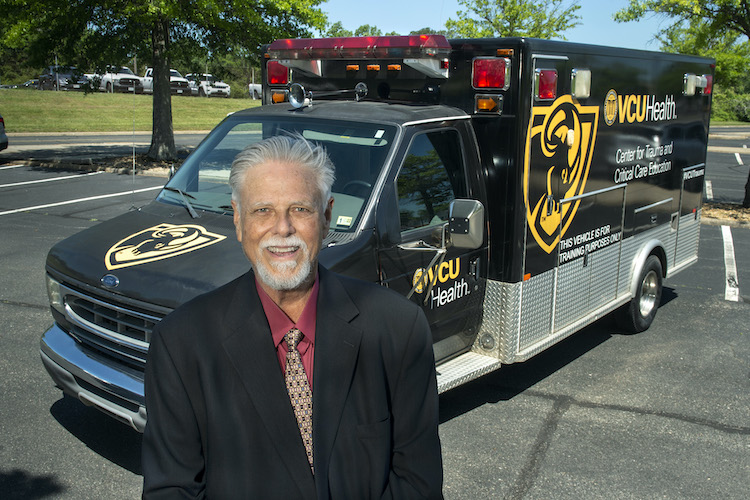
Raising the bar for emergency medical care outside hospital walls
Pentagon, international communities seek training from VCU, the birthplace of standardizing education for emergency medical services in Virginia.
May 19, 2022
By James Shea and Laura Rossacher
Imagine this: You need medical help after suffering a heart attack at home or a severe injury from a car crash. Paramedics arrive, administer CPR and give oxygen, insert IV lines and administer drugs to stabilize you until you arrive at the hospital. When minutes count, your overall outcome and recovery may depend on the quality of care you receive during the ambulance or air transport ride.
Today, the over 37,000 EMS providers in Virginia have standardized education. VCU’s Center for Trauma and Critical Care Education, established in 1980, offered the first academic medical center paramedic program in Virginia to educate the mostly volunteer EMS community in Central Virginia. Now, around half of the health care professionals who pass the paramedic board exam in Virginia have trained at VCU.
“We are really proud of what we’ve become, and the impact we make in trauma education and training,” said James Gould, the center’s director. Gould’s career has come full circle. He was part of the first paramedics class in 1980, along with 20 other students. Now, the program can have as many as 100 students enrolled at any given time and its footprint stretches across the state from Williamsburg to Roanoke and into Northern Virginia.
When tragedy turned into opportunity
“Until the 1980s, there was no statewide standard for trauma training for EMS providers. It was the luck of the draw who responded to an emergency call and how skilled that particular EMS provider was,” said Gould.
The tide shifted when a Virginia state senator at the time was involved in a serious automobile wreck. The emergency professionals who responded to the call stabilized the senator’s spine and their quality of care saved him from potential paralysis. Therefore, when Kimball Maull, M.D., who worked at VCU Medical Center, approached the Virginia General Assembly with a funding request for a training program for emergency professionals in Richmond, he received $97,000 to start the program.
Originally, the center trained emergency professionals at fire departments in Richmond as well as Henrico and Chesterfield counties. Over time, those departments have brought training in-house, and now the center works with many of the smaller fire departments across the state that do not have the resources to provide training.
“Paramedics are critically important to a fire department. That is clearly the case today. More than 80% of calls to a fire department today are for emergency services,” Gould said.
Training our military
Starting as a place to train paramedics in Richmond, the center has become an internationally recognized leader in continuing education for all levels of health care.
Nationally, VCU Health has a longstanding relationship with the military, training medics who are part of special forces teams. In 2016, the Pentagon enlisted VCU’s Center for Trauma and Critical Care Education to provide paramedic education courses at Fort Lee. Through this partnership, both military and nonmilitary students gained clinical internship experience in the emergency room at VCU Medical Center and in other specialty areas, including obstetrics, pulmonary-respiratory and cardiology.
The following year, the U.S. Army awarded VCU Health the Army Community Partnership Award as one of the few paramedic training programs in the country with military partnerships.
Educating communities abroad

Between 2017 and 2019, VCU Medical Center team members played an important role in building trauma and EMS systems in Rwanda, a low and middle-income country with roughly 13 million residents. Rwanda did not have a formal training program to standardize prehospital emergency care at the time.
Leaders from Rwanda spent 15 weeks in the United States and learned about emergency medical services, emergency medicine, trauma care, critical care and trauma and EMS administration at VCU Medical Center. Rwanda’s Ministry of Health also collaborated with CTCCE to create customized, context-specific paramedic training courses to rapidly standardize care delivery in the country. Kenneth Williams, paramedic program director in the Division of Acute Care Surgical Services, led a team of educators to provide a train-the-trainer program for Rwandan leaders.
Adam Alford, assistant director at the Center for Trauma and Critical Care Education, said it is unique. The educational program is tailored to fit the needs of the partner with which they work. Some departments want the entire coursework completed through VCU. Others can complete some of the work in-house but need VCU to provide supplemental education
“We have the reputation to be flexible.” Williams said. “Every time you turn around there is another department wanting to work with us.”
Rebuilding a quality workforce close to home
And there is the need. Virginia, and the country, need more qualified emergency personnel. Many emergency services personnel left the profession due to the stress of COVID-19, and many of the older emergency medical professionals are retiring. To fill open positions across the state, departments are sending recruits to VCU for training.
“Everyone across the state is reaching out to us, asking for help training new providers,” Gould said. “To take the load off of the ones who have been in the trenches, you need highly qualified new staff. I am thankful we can offer that training resource right here in Richmond at VCU.”

